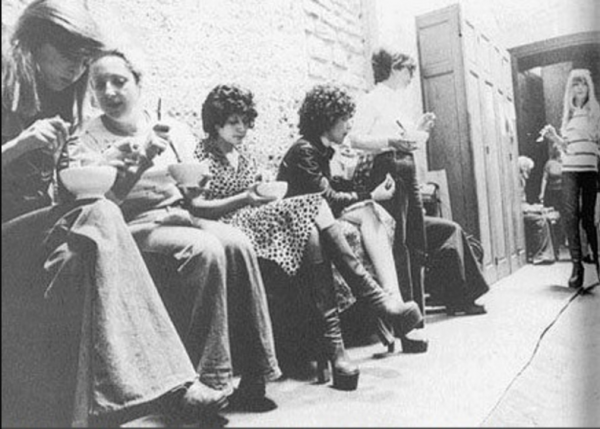
I was a scab on Wednesday during the Women’s Strike. Too broke and disorganized as usual, still messily addicted, I ended up having to see a client. And sure, I wore red, and I limited my shopping to the South Asian woman-owned convenience store down the street, and I tried to allow the organizers’ reassurance to poor women that donning my ratty old Red Sox t-shirt would suffice as participation to soothe me. But I felt the usual radical white guilt I always feel on similar occasions like Buy Nothing Day, shame at the fact that I wasn’t part of this leftist ritual.
And I was irritated with myself for being ashamed. I knew this strike couldn’t realistically rely on all women joining it. Even if we were all ideologically inclined the same way, even if we could all afford to take the day off work, women aren’t all one class of worker, and that complicates things. The many schools forced to close anticipating teachers not coming in demonstrated that the action had real economic impact. But ultimately, its effect was symbolic, meant to show how much everyone relied on women’s paid and unpaid labor. I did wonder skeptically how many women employers had actually given their nannies and domestic workers a paid day off as organizers suggested, when usually, that domestic work is what allowed these women employers the time for political action in the first place. But I had to admit that the organizers had thought of multiple ways for women in many different economic circumstances to show solidarity.
Still, I was distrustful of these strike organizers, some of the same women behind the Women’s March on Washington the day after the inauguration, the people who erased pro-sex workers’ rights language from their agenda document. Only ex-sex worker and acclaimed writer and editor Janet Mock’s public protest at the omission compelled them to add it back. But the pro-sex worker statement, once reinstated, had to keep company with the anti-trafficking discourse that had been written in in its stead. And how comfortable were young trans sex working women, like the teenaged Janet Mock was, supposed to be faced with a cadre of marchers who thought that wearing hot pink plush vagina hats as a symbol of their womanhood was an excellent idea? The pervasive transmisogyny and anti-sex worker sentiments within liberal feminism can be subtle in their manifestation, but it still feels like they’re always there.
But sex work was included in the strike organizers’ February announcement of the action in the Guardian as one example of the gendered labor women were striking from. (Maybe we have prison abolitionist sex worker ally Angela Davis, one of the many co-authors of the statement, to thank for that.) And this time, with a new coalition called the International Women’s Strike USA joining the March organizers in drafting it, sex workers were also included in the call for labor rights on the U.S. Women’s Strike platform. Trans women were acknowledged in that agenda multiple times as well. Many sex workers’ rights organizations around the world, from the U.S. PROS Collective to Ammar, had announced their intention to join the action. So why did I still feel bitter?

These were steps towards reconciliation, and wasn’t that what sex workers’ rights movements had always wanted? For mainstream feminist movements to take their heads out of their asses and see us as women and workers?
Still, I was left wondering where all these masses of women had been when Backpage shut down and drove sex workers into economic panic–that is, when Backpage shut down because of pressure from government forces aligned with an anti-trafficking industrial complex, itself fueled by neoliberal feminist support. And where were all these women suddenly concerned with the fates of immigrants and refugees in this new proto-fascist regime, when migrant sex workers had been arrested and summarily deported for years before this, with that same anti-trafficking hysteria used as a rationale for that treatment?
Sex worker activists can teach women’s movements so much. We ourselves have a long history of labor strikes, from sex workers in Hawaii striking against martial law and brothel regulations in 1942, to the Lyons church occupation of 1975, to the 2012 Spanish sex worker strike against bankers. Sex work is the very epitome of gendered labor, so we women and marginalized people who do it know that when we stop our work, it always makes the patriarchy blink. They don’t respond well to not being able to get laid for love or for money. (In fact, one of the earliest cultural examples of a women’s strike, as depicted in Aristophanes’ play Lysistrata, was a strike on sexual labor.) More generally, since the criminalization of prostitution and the marginalization of prostitutes has always taken place on a state and local level, sex worker activists can serve as role models in our local organizing for feminist movements stymied by a national government committed to fringe right-wing agendas.
But we can’t ally ourselves wholeheartedly with feminists until they ally themselves with us.
We are now finally being acknowledged as participants in feminist actions, but that doesn’t change the fact that mainstream feminism itself still collaborates in our oppression. That collaboration can range from purportedly “radical” feminists denying our womanhood and our humanity online to the feminist academics, social service workers, and CEOs running the machine of anti-trafficking organizations. This is a wound which will always remain open unless feminists examine their own support of anti-sex worker policies.
We are all intersectionally fucked right now—migrant sex workers, Muslim sex workers, sex workers of color, trans sex workers, disabled sex workers, those of us who can get pregnant, all of us without a straight job which provides health insurance—the list goes on. Under the Trump regime and the authoritarian movements gaining power globally, sex workers are imperiled even further now by the marginalized identities we have which aren’t even explicitly criminalized. We need strong political alliances more than ever, and we can’t afford to be attacked on so many fronts. So we have to keep challenging other feminists to truly include us by dismantling their anti-trafficking NGO and lobbying apparatus. And hopefully, someday soon, they’ll take us up on it.

An Opinion:
Well written with realistic views. Unfortunately, the alt right is in ascendency because the “deplorables”, allied with the most base, crass, unthinking people seem most motivated at the moment. All of us who are marginalized in any form need to show common cause and work TOGETHER.. The starting point is to accept OURSELVES as who we are, and accept OTHER MARGINALIZED people as equally valued people of Resistance. In the short term, we, not unlike the author, are about to have our personal worlds greatly challenged.
Caty thank you for this.
I also had to take a client on Wednesday for similar, or maybe the same reasons and felt guilty about “not participating.” The guy even asked something like, “Aren’t you supposed to be off today?” and I just made some comment about making up for the absence of ohers. Maybe I should have told him I should be paid extra for working on a holiday!
The actions of this administration continue to appallingly surprise me, though I shouldn’t be surprised at all. I’m really scared and anxious about what’s coming next, and what else will happen in the next four (really hope it’s just four!) years. Some clients appreciate their perceived benefits of Trump, and sometimes it’s hard to keep my mouth shut in opposition.
This is a beautiful piece. Thank you. Thank you a whole lot.
Feminists don’t care about women, cis or trans and they certainly don’t care about sex workers. We need to take care of our own.
I was off that day, but because I had no appointments, not through any effort of my own. Making money and surviving means I would have taken a client had a suitable one presented himself. I was still on Twitter, and answering emails, and that to me is work.